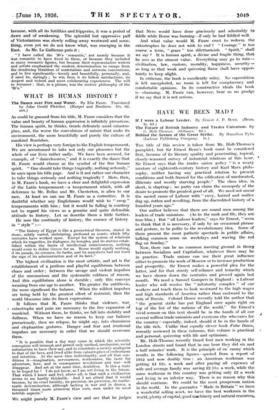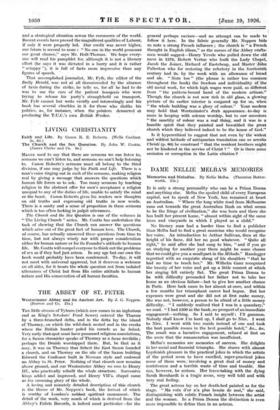HAVE WE BEEN MAD ?
Behind the Scenes of the Great Strike. By Hamilton Fyfe. (Labour Publishing Company. Is.)
THE title of this review is taken from Mr. Holt-Thomas's
• pamphlet, but Sir Ernest Benn's book must be considered first, because of its literary quality and penetrating, topical, closely-reasoned survey of industrial relations at this hour. Sir Ernest says that the trades union policy " is a weary mixture of eighteenth-century history and Karl Marx philo- sophy, neither having any practical relation to present conditions and both framed for the edification of uneducated, illiterate and mostly starving people." The class idea, in short, is claptrap ; no party can claim the monopoly of the desire to promote the greatest good of all. We need not smear the sacred cause of Labour with " envy, hatred and malice dug up, rotten and revolting, from the discredited history of a hundred years ago."
Our author believes that there are sound men among the leaders of trade unionism. (As to the rank and file, they are true-blue.) But " all Labour leaders," says Sir Ernest, " seem to think that it is necessary, if only by an occasional phrase and gesture, to be polite to the revolutionary idea. Some of them present the most pathetic spectacle in public affairs; talking common sense on weekdays and waving the red flag on Sunday."
Now, there can be no common meeting ground in theory between Socialism and Capitalism, whatever there may be in practice. Trade unions can use their great influence either to promote the work of Moscow or to increase production and prosperity. Sir Ernest makes a powerful plea for the latter, and for that sturdy self-reliance and tenacity which we have shown down the centuries and proved again last month. We need a Samuel Gompers in England : a Labour leader who will resolve the " inferiority complex " of our workers and teach them to look westward to the high wages and high standards of America rather than eastward to the ruin of Russia. Colonel House recently told the author that " the general strike has put England once again right on top of the list of the nations of the world." Sir Ernest's vivid sermon on this text should be in the hands of all our several million trade unionists and everyone else who cares for the country2-especially, indeed; should it be in the hands of the idle rich. Unlike that equally clever book False Dawn, recently reviewed in these columns, this volume is practical and personal, quivering with life and optimism.
Mr. Holt-Thomas recently timed four men working in the London streets and found that in one hour they did six and a half minutes' work. It is the principle of ca' canny which results in the following figures—quoted from a report of 1912 and now doubly true : an American workman was getting £4 12s. a week and after paying all expenses of wife and average family was saving £2 118. a week, while the same workman in this country was getting only £2 a week and living in an inferior way. There is no reason why this should continue. We could be the most prosperous_ nation in the world. In the guarantee " Made in Britain " we have a wonderful selling asset, we have the best workmen in the world, plenty of capital, good machinery and natural resources, and a strategical situation across the commerce of the world. Recent events have proved the -Magnificent qualities of Labour, if only it were properly led. ._Our credit' was never higher, our future is second to none*.:. " No one in the world possesses our great chance," says* Mr. Holt-Thoinas. - We hope every- one will read his pamphlet for, although it is not a literary effort (he says it was dictated in a hurry and it is rather " serappy'")., it is full of facts more impressive than any
figures of speech. ‘" - - - That accomplished journalist, Mr. Fyfe, the editor of the Daily Herald, was not at all diseorninoded by the abSence of taxis during the strike; he tells us, for all he had to -do was to use the cars of the *patient . bourgeois who were trying to release his party's stranglehold on transport. Mr. Fyfe cannot but write vividly and -interestingly and his book has several chuckles in it for those* who dislike his polities, as, for instance, when the printers demurred at producing the T.U.C.'s own British Worker. _











































 Previous page
Previous page